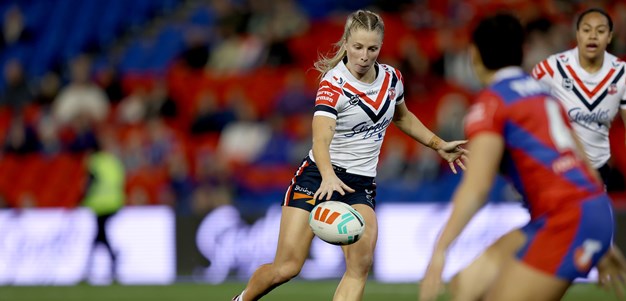
In an era where centres were renowned for their skills, Mark Harris revolutionised the role as a damaging runner of the ball, and after numerous overseas ventures, he etched himself as one of the finest Roosters of all.
| Name: | Mark Walter Harris |
| DOB: | 22/08/1947 |
| Club Debut: | Round 9, 1970 vs Canterbury-Bankstown |
| Roosters Player No. | 608 |
| First-Grade Games for Club: | 195 |
| First-Grade Points for Club: | 298 from 88 tries and 17 goals |
| Premierships: | 1 (1974) |
| Representative Career: | 12 World Cup and Test Matches for Australia (1970-1977) 11 matches for NSW (1970-1978) 4 matches for City (1972-1977) |
| Individual Accolades: | Channel 9 Rookie of the Year 1970 Sun Herald Player of the Year 1972 Appeared in Four World Cups (1970, 1972, 1975, 1977) Equal-Most Capped Rooster (1979-1987) Sydney Roosters Centurions (2007) |
Growing up in Brisbane, Harris' journey to Bondi was far from direct, and if anything, one of the most unique finds in Club history; after spending two years in Papua New Guinea from 1968 with the Kone Tigers, he was spotted by the son of Club President and 1936 Premiership-winner Jack ‘Buster’ Craigie.
Convinced to don the Red, White and Blue in 1970, Harris began his tenure with the Club in reserve grade, but quickly rose through to make his first-grade debut on the wing in Round 9.
Scoring a try in the 18-16 victory over Canterbury-Bankstown, Harris' impact was immediately felt, finishing his debut season claiming Channel 9’s Rookie of the Year gong, and duly rewarded with appearances for both New South Wales and Australia in that year’s World Cup.
1974 Grand Final: Mark Harris Finishes Off a Remarkable Effort
Emerging as one of the competition’s most destructive runners of the ball, Harris – easily distinguished by his flattened nose and handlebar moustache – soon stamped himself as an out-and-out centre, taking over the role held by Roosters stalwart Ron Saddler.
Helping to propel the Tricolours to the 1972 Grand Final as he left defenders in his wake, the giant three-quarter's career in the Tricolours was nearly over as quickly as it had begun, as he impressed scouts at an impromptu gridiron kicking competition.
Soon enough, Harris accepted an offer to trial with the Boston Patriots in the NFL following his impressive showing, before making the move to the Canadian Football League with the Montreal Alouettes, playing fourteen matches in the 1973 season.
Despite his prowess and hefty paycheque, his desire to return to Australia and the thirteen-man code proved to be too great as his talents went to waste in his limited role as a specialist kicker.
It was no coincidence that his return saw the Club claim their first Premiership in 29 years in a season that saw him feature in nineteen matches, scoring eight tries, including the match-sealer in the 19-4 Grand Final victory over Canterbury-Bankstown.
The following season he was just as instrumental to Easts’ charge to retain their title, holding the mantle as the competition’s leading try-scorer with fourteen to his name, however, a leg injury prevented him from participating in the memorable Grand Final.
Known for his strong combination with fellow centre John Brass as the pair formed an ‘odd couple’ in the backline, Harris continued to leave defenders in his wake after running off silky passes from his teammate and found the line more often than not with his raw power and speed.
Helping the Club to further silverware with the 1976 World Club Challenge title, Harris was also an integral member of the Roosters until the end of the decade, playing in both Wills Cup Pre-season competition titles in 1974 and 1977, as well as both AMCO Cup Mid-week competition victories in 1975 and 1978.
They had been everything for me.
Mark Harris On the Roosters
On the representative scene, the barrel-chested centre featured in four World Cup campaigns (1970, 1972, 1975 and 1977) for ten appearances – surprisingly all on the wing – while lining up for eleven interstate games for NSW and four for NSW City.
His longevity and passion for the Club saw him finish his career in Bondi as the second most capped Rooster with 195 games alongside teammate Barry Reilly at the completion of his tenth and final season in 1979 - distinguished as the only player to feature in every season throughout the entire 1970s.
In retirement, Harris found himself as a member of the NRL’s Judiciary panel in the early years of the 21st century, and remained an ardent Roosters supporter throughout, and is still one of the most fondly-remembered clubmen to this day.
In 2007 as the Roosters celebrated their 100th season in the competition, Harris was named alongside Brass in ‘The Centurions’ – the greatest Roosters to have played in 100 games or more for the Club, arguably his finest achievement.
A pioneer of Australian sports overseas and a sledgehammer in attack and defence, Mark Harris lives on as one of the strongest, fastest and most talented centres the modern game has seen.







